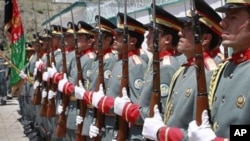As U.S. troops begin their gradual paced withdrawal from Afghanistan this month, both the U.S. and the Afghan governments are making tentative explorations towards a political settlement with the Taliban, or at least some elements of it. But the process of “reconciliation,” as it has been dubbed, is tricky.
In the post-World War II era, most wars end not with outright victory, but with a negotiated settlement. In wars far apart in time and place, like Vietnam, the Balkans, and Sudan, talking replaced the shooting.
In some cases, the talks led to an eventual permanent resolution and stability.
In others, they merely bought time for one side to extricate itself from the conflict.
Now, as U.S. troops start their gradual withdrawal from Afghanistan, the first tentative moves are being made toward political negotiations between the government of Afghan President Hamid Karzai and some as-yet unspecified segments of the Taliban movement.
The talks have the backing of President Obama, who said in June that Afghanistan cannot have peace without a political settlement.
“As we strengthen the Afghan government and security forces, America will join initiatives that reconcile the Afghan people, including the Taliban," said President Obama. "Our position on these talks is clear: they must be led by the Afghan government, and those who want to be a part of a peaceful Afghanistan must break from al-Qaida, abandon violence, and abide by the Afghan constitution.”
Andrew Wilder, a South Asia analyst with the U.S. Institute of Peace, is hopeful but says the prospects for a tidy outcome of talks are not too encouraging.
“I think there’s a lot of hurdles, a lot of complications as I don’t think it’s necessarily going to end in a nice, neat grand bargain," said Wilder. "But I think if we start pursuing different opportunities as they present themselves, some might materialize, some won’t. But bit by bit, if we can get agreements with some of the groups within the Taliban and create some momentum, I think, I still hold out hope for a negotiated settlement.”
The U.S. strategy is to train Afghan army and police to the point that they can take over security duties, allowing U.S. forces to pull out by 2014.
At the same time as the drawdown, remaining U.S. forces will bring military pressure to bear on the Taliban to bring them to the negotiating table.
Most analysts believe the Afghan army is progressing slowly but steadily -- but that, as Andrew Wilder points out, the police lag far behind.
“Despite the billions of dollars invested now in improving the quality and quantity, the police are still in many areas viewed to be a big part of the security problem rather than the solution, and a very predatory force and a force that is actually undermining the popularity of the government rather than improving security for citizens," he said.
And it is not clear who among the various Taliban factions would be willing to make a deal or what they would demand.
Former Afghan ambassador to the United States Said Tayeb Jawad says the Taliban may not feel under pressure to make a deal.
“The Taliban are more and more under pressure, especially in the south, but they have more freedom of movement in other parts of the country," said Jawad. "They’re not perceived to be losing the war completely. And if they are not losing, they’re not really compelled to talk because the definition of victory for the Taliban is very different than the definition of victory for the United States or the Afghan people.”
The Taliban have claimed responsibility for several recent high-profile assassinations, including those of the half-brother of President Karzai and the mayor of Kandahar.
But after the killing of the Kandahar mayor, U.S. ambassador to Afghanistan Ryan Crocker said the assassinations are a sign of Taliban weakness, not strength.
“I would judge that the Taliban is now damaged to the point where they can no longer conduct field operations and they have had to regroup and figure out what they can do and in some cases that has been assassinations, and again, very similar patterns in Iraq," said Crocker. "Clearly these are horrific attacks, but they can also be interpreted as a significant organizational weakness on the part of the adversary.”
Analysts say the Taliban will seek to exploit any perceived weakness in the Afghan government, including corruption, which was highlighted in the latest scandal that hit the country’s top financial institution, the Kabul Bank.




